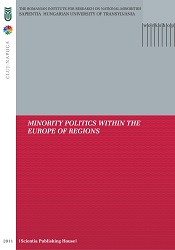Spain: from the Autonomy Model to the Federalism. The Case of Catalonia
Spain: from the Autonomy Model to the Federalism. The Case of Catalonia
Author(s): István Szilágyi
Subject(s): Politics / Political Sciences
Published by: Scientia Kiadó
Keywords: Catalonia; Governance without Government; Westphalian-type international system;disintegration;ethnic minorities; territorial autonomy
Summary/Abstract: The 21st century is the era of globalisation, encounters of different cultures, civilisations and identities, as well as political systems and governmental forms recorded in universal models. The turbulent international system including several participants and actors is being organised and operated in the forms of networks and streams. The situation „Governance without Government” and the institutional solutions of classical regionalism are being supplemented with the multilevel governing structures of new regionalism. The Westphalian-type international system based on the absoluteness and omnipotence of state characters was transformed and disappeared. The validity of the notion „nation-state” used in the 18-19th centuries, which involved homogeneity, came to an end. Simultaneously with the integrationist tendencies and organisations of the new regionalism superseding the territorial principle, the processes of disintegration concerning the ethno-regionalism have intensified. They have led again to the establishing of multinational states in Central- Eastern Europe and in the territory of the former Soviet Union. It emerged the questions of defending ethnic minorities, and thus, the minority politics got into the limelight. The identities of different types encountering and living together in the regions of Europe have changed the classical meaning of the „holy trinity” of state, nation, and nationality. In 1992, regarding the multi-ethnical Spain, Juan José Linz pointed out that „Spain today means the state of all the Spanish; it means nation-state for the majority of the population, but for the minority, it only means state and not nation.” In Spain, the democratically ruled co-existence of state (the Spanish Monarchy), the historic nations (Basque, Gallego, Catalan, and Valencian), and the nonhistorical regions (Cantabria, Asturias, Extremadura, Madrid, Murcia, La Rioja, etc.) has been realised. All this happened in a country where 20% of the population is Catalan, 6% Basque, 2.5% Gallego, and 2% is Valenciano. It is vital that Spanish new democracy played an important part in solving a 100-year-old problem by creating an autonomy model based on 17 self-governing communities. The system carried out between 1979 and 1983 still proves to be viable. The stability does not mean motionlessness. The constitutional system in the state is constantly changing. Between 1983 and 2010, unprecedented process of decentralisation and democratisation took place in Spain. As a consequence, nowadays, the state of autonomies has the features of a federal system. The changes leading from half-federalism to federalism were accelerating from the second half of the 1990s, and in July 2006, it resulted in accepting the new autonomy status of Catalonia. The self-governing territory with the capital of Barcelona, which gained the status “sovereign nation”, came up with a real alternative of separation from Spain. The process and the changes in Spain and Catalonia led to some conclusions that were useful for the minorities struggling for autonomy in Central and Eastern Europe. The Spanish and Catalonian solution, in the name of the concept „cultural nation”, raised the question of the validity of the model for the minorities that live in multinational Central European states. The political self-governance, the territorial autonomy, the connection between keeping the national identity and using their mother tongue, and the creation and maintenance of the governmental system draw the attention to the adaptability of this type of state-building model realised in the EU. The system of the problems being very serious, it needs a comparative analysis. The replies to the indicated questions go beyond the frame of this study.
Book: MINORITY POLITICS WITHIN THE EUROPE OF REGIONS
- Page Range: 107-119
- Page Count: 13
- Publication Year: 2011
- Language: English
- Content File-PDF

